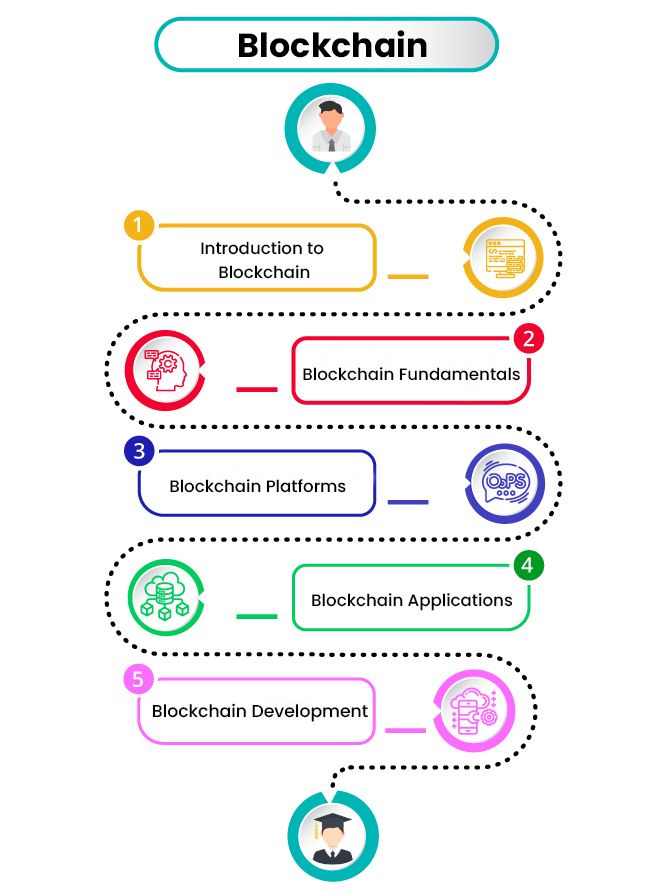Curriculum in Blockchain
Introduction To Blockchain And Cryptocurrencies
1st Generation Of Blockchain
2nd Generation Of Blockchain
3rd Generation Of Blockchain
Future Trends In Blockchain
Bitcoins
Excerises
Blockchain Architecture
Introduction To Ethereum
Blockchain Platforms
Blockchain Applications
Introduction To ICO
Curriculum in Blockchain
Blockchain Is Preferred by Over 35% of Developers. Blockchain is the most widely used and in-demand programming language in the IT industry.
- History
- Bitcoin or bitcoin (Do you know the difference)?
- CentralizedLedgers
- Decentralized Ledgers
- Functions of currency
- Distributed consensus
- Consensus Mechanisms ex. POW, POS, DBTF (delegated Byzantine Fault Tolerance) etc.
- Financial use cases
- Non-Financial use cases
- Price Derivation of Bitcoin and other Altcoins
- Demo and Excercise
- Hash functions ex. SHA256
- Bitcoin Improvement Protocol ex. BIP 32
- Merkel root
- Address
- Symmetric and Asymmetric Encryption
- Digital signatures
- Bitcoin Dictionary
- Demo of Features
- Lab session and Excercise
- Transactions
- Blockchain Ledger
- Demo of Blockchain
- Bitcoin units
- The network
- Bitcoin Improvement Proposals (BIPS)
- Community
- Demo
- Blockchain explorers
- UXTOS
- Bitcoin Mining
- Algorithm
- Mining pools
- Hardware Wallets
- Security and centralization
- Lab session and Excercise
- Wallet types
- Bitcoin Clients
- Deterministic wallets
- Backups
- Demo of Wallets ex.
- Lab session and Exercise: Set up your Wallet
- Trade Bitcoins
- Buy and sell Bitcoins
- Invest
- Hedging
- Introduction to Altcoins ex. NEO
- Lab session and Excercise
- Lab session and Excercise
- Reality about Blockchain and How Blockchain works?
- Blockchain Architecture and Platforms ex. BigChainDB, Corda, Ethereum etc.
- DTL- Distributed ledger
- Consensus Mechanisms ex. POW, POS, DBTF (delegated Byzantine Fault Tolerance) etc.
- Real demo of Blockchain with a simple example
- Distributed VS Decentralized network
- Private and Public Blockchain
- Consortium Blockchain
- Permissioned and Permissionless Blockchain
- Public and Private Key creation
- Storing Private and Public key
- Mining
- Genesis Block in Blockchain
- Hard fork
- Consensus Mechanism
- 51% Attack theory
- Exercise: Set up your Private Blockchain
- Exercise: Blockchain use cases for Banking, Insurance etc.
- Extra: How to design Blockchain Architecture, Blockchain use cases, Requirements Analysis etc.
- Design the admins and user Interfaces of Blockchain. Examples Demonstration with HTML5, CSS, Solidity
- Blockchain Architecture and Platforms ex. BigChainDB, Corda, Ethereum etc.
- Introduction to Ethereum
- Basics of Ethereum
- Introduction to Web 3 and Truffle
- Introduction to smart contract
- Components of smart contract
- Exercise: Create and deploy Smart contract
- Ethereum tools ex. Mist, Dapps and accounts
- Ethereum Test Rpc
- Introduction to solidity programming
- Structure of Solidity contract
- DApps and DAOs
- Lab session and Excercise
- Introduction to Blockchain platforms ex. Multi chain
- Blockchain as a service (BAAS) on Microsoft Azure
- Blockchain on AWS (Amazon web services)
- Blockchain on IBM Bluemix
- Exercise: How to set up Private Blockchain on Multichain
- Exercise: How to set up Private Blockchain on Amazon Web services
- Blockchain Ripple Framework
- How to create Blockchain for real projects ex. KYC, Travel Insurance etc.
- Blockchain API
- Blockchain waves platform
- Introduction to Monero
- Introduction to next generation platform- IOTA
- Introduction to IOTA and Tangle Architecture
- Blockchain and Artificial Intelligence
- Blockchain and Internet of Things
- Exercise: How to Create AI Chatbot and deploy on Blockchain
- Exercise: How to Create AI Chatbot and deploy on Blockchain
- How ICO is a new way of raising money
- ICO regulations
- How to issue your own ICO token?
- How to launch an ICO platform?
- ICO Strategic and Marketing techniques
- Exercise: ICO


.png)
.png)
.png)
.png)

.png)
.png)
.png)
.png)
.png)


























